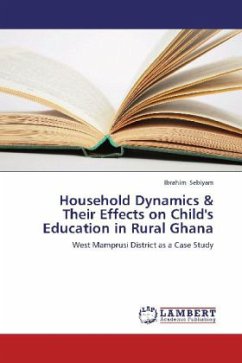The household plays a significant role in shaping the minds of children for formal education. Also, it is also considered as the first school of the child. However, when it comes to educational strategic planning, the household is often left out. Though government and other educational stakeholders have contributed immensely to educational development in rural communities, the inability to understand the Inter and Intra-Household dynamics and their influence on children's education in rural Ghana especially in the West Mamprusi District of the Northern Region. This Book therefore seeks to unearth these dynamics and how they affect children's education in rural Ghana focusing on West Mamprusi District of the Northern Region of Ghana.This book will help you to further understand both supply and demand factors is providing education. It also looks at gender discrimination in accessing education.
Bitte wählen Sie Ihr Anliegen aus.
Rechnungen
Retourenschein anfordern
Bestellstatus
Storno








